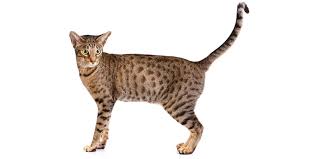
Ocicat
Conditions of detention
Ocicats are adaptable and thrive in various living environments, from apartments to larger homes. They are active and enjoy interactive play, so providing them with toys and space to explore is important.
Useful Fact:
Ocicats are highly social and enjoy being part of the family. They are known for their friendly and outgoing nature and often get along well with other pets and children.
Nutrition and diet
Ocicats require a balanced diet rich in high-quality protein to support their muscular build and active lifestyle. A combination of wet and dry food ensures they receive necessary nutrients and hydration. Monitoring their food intake is crucial to prevent obesity.
Useful Fact: Including omega-3 and omega-6 fatty acids in their diet helps maintain their coat’s health and shine.
Health
Ocicats are generally healthy cats with no specific breed-related genetic disorders. Regular veterinary check-ups are important to monitor their overall health and detect any potential problems early. Vaccinations and preventive care are essential.
Useful Fact: Ocicats can live up to 15 years or more with proper care and nutrition.
Grooming and care
Their short, sleek coat requires minimal grooming. Weekly brushing is usually sufficient to keep their coat healthy and shiny. Regular nail trimming, ear cleaning, and dental care are also important.
Useful Fact: Despite their minimal grooming needs, Ocicats enjoy the bonding time during grooming sessions.
Education and training
Ocicats are highly intelligent and can be trained to follow basic commands and use a litter box efficiently. Positive reinforcement techniques, such as treats and praise, are effective in training this breed.
Useful Fact: Their intelligence and curiosity make Ocicats quick learners who enjoy interactive toys and puzzle feeders.
Toys and entertainment
These active and playful cats enjoy a variety of toys, including feather wands, interactive toys, and puzzle feeders. Providing climbing structures and high perches can help satisfy their natural instincts and keep them entertained.
Useful Fact: Ocicats are known for their love of interactive play, which helps keep them mentally and physically stimulated.
Safety
Ocicats should be kept indoors or in a secure outdoor enclosure to protect them from potential dangers such as traffic, predators, and diseases. Microchipping and providing identification tags are essential for their safety.
Useful Fact: Their adventurous and curious nature makes it important to ensure a safe and secure environment to prevent them from wandering off.
Accessories
Essential accessories for Ocicats include a comfortable bed, high-quality scratching posts, a variety of toys, and a sturdy cat carrier for travel. Regular grooming tools like brushes and nail clippers are also important.
Useful Fact: Investing in interactive toys and climbing structures can help keep Ocicats mentally and physically stimulated.
Socialization
Ocicats are highly sociable and thrive on human interaction. They get along well with children and other pets, making them excellent family companions. Early socialization helps them become well-adjusted and confident adults.
Useful Fact: Their friendly and outgoing nature often leads them to seek out attention and companionship from their owners.
Travel and Transportation
When traveling, use a secure and comfortable cat carrier. Familiarizing your Ocicat with the carrier before trips can reduce stress. Ensure they have access to water and take breaks during long journeys.
Useful Fact: Bringing familiar items like a favorite blanket or toy can help reduce anxiety during travel.
Behavior and psychology
Ocicats are known for their playful, active, and social nature. They enjoy interactive play and form strong bonds with their families. Their friendly and outgoing personality makes them excellent pets for active households.
Useful Fact: Ocicats are known for their vocalizations, often communicating with their owners through a variety of sounds.
Legal aspects
Ensure your Ocicat is up-to-date on vaccinations and registered according to local regulations. Spaying or neutering is recommended to prevent unwanted litters and reduce certain health risks.
Useful Fact: Many regions require cats to be microchipped and wear identification tags, which can help in reuniting lost pets with their owners.


